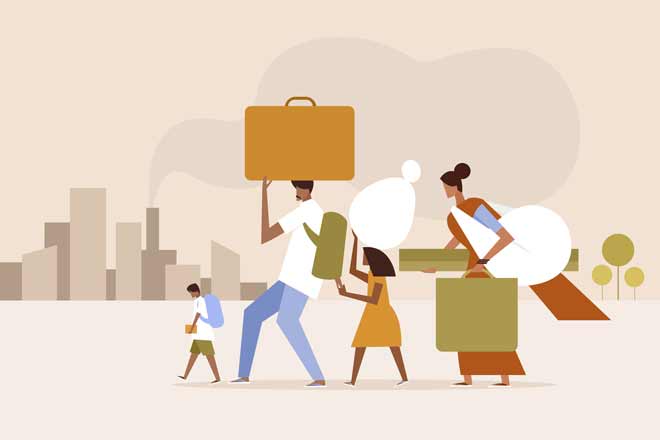What does it mean to be a refugee or asylum seeker?
According to amnesty.org, refugees are people who have left their country because they are at risk of having their rights violated. This is often a result of lack of protection from their own government. Refugees have a right to international protection.
Asylum seekers are people who have left their country for similar reasons and are seeking safety. Usually, asylum seekers have not been legally recognized as refugees and need approval of their asylum claim. Asylum seeking is also deemed a human right.
It is important to note that people seeking refuge or asylum have identities outside of this status. They should be treated and recognized as whole people, rather than diminished solely into these labels.
What are some examples of current refugee crises?
The United Nations estimates there were 82 million displaced people around the world at the end of 2020. According to the organization World Vision, some countries with the most pressing refugee crises in the world are:
- Ukraine: Due to the Russian invasion of Ukraine, the U.N. estimates that there will be up to 5 million Ukrainian refugees over the course of the conflict.
- Syria: The Syrian Civil War has left 5.5 million refugees since it began in 2011. As of October 2020, 2.6 million Syrian children were considered refugees. Most have sheltered in nearby countries such as Turkey, Lebanon, Jordan, Iraq and Egypt.
- Venezuela: The economic instability and political turmoil in Venezuela have led to 4.6 million refugees and migrants leaving the country. In need of medicine, food and security, most of them have gone to nearby countries such as Colombia, Peru, Brazil and Ecuador.
- Afghanistan: The economic difficulties, political conflict and changing climate have led to 2.7 million refugees from Afghanistan. The droughts and lack of infrastructure have contributed to people fleeing to Iraq, Pakistan and various European countries.
It is important to note that this is nowhere near an exhaustive list of refugee crises throughout the world. Many other such communities need humanitarian aid and support as they rebuild their lives.
How can the mental health of refugees be affected?
According to the World Health Organization (WHO), refugees have a higher prevalence of mental health challenges such as depression, anxiety and post-traumatic stress disorder (PTSD) than the general population. These mental health concerns often stem from the variety of challenges and hardships that refugees face. These include:
- Exposure to violence and destruction
- Lack of access to basic services
- Separation from family, friends and support
- Immigration detention
- Difficulties assimilating into new countries, and experiencing racism and exclusion
- Challenges obtaining housing and employment in the new host countries
It is also important to note that refugees may struggle to establish mental health care due to high cost, language barriers in their new countries and disruption in continuity of care as they are forced to leave their home nations.
To address these challenges, the WHO advocates for education about the unique needs and challenges of people with refugee status, integration of mental health services into primary care services, and the availability of robust and affordable mental health care programs. Also, the American Psychiatric Association suggests that health care providers link refugees with psychosocial support and aid for housing, employment, education and legal services.
How to Help
According to the U.N. Refugee Agency and the International Rescue Committee (IRC), these are ways you can help refugees and asylum seekers all over the world:
- Get involved with community sponsorship. If there is a local sponsorship program, you can work with others in your community to raise money and support refugees in your area.
- Engage with your elected officials to advocate for bills and policies that support refugees.
- Fundraise and donate to refugees via reputable aid organizations.
- Host a stay for a refugee in temporary need of shelter via the IRC partnership with Airbnb: org/get-involved?locale=en.
- Look for IRC volunteer opportunities near you: org/volunteer.
How to Help in Baltimore
- Donate to the Welcome to Maryland Fund for Afghan refugees resettled in the state. This can include donating needed supplies, volunteering and donating money.
- Volunteer with the International Rescue Committee in Baltimore. Current opportunities include the following.
- Youth Success Coach Volunteer for refugee youth: Meet with refugee youth to help them meet their goals.
- Family Mentor Volunteer: Work with a refugee family to ease their transition to living in Baltimore.
- Welcome Home Project Volunteer: Prepare an apartment and help welcome a family.
- Volunteer with World Relief Baltimore. Current opportunities include the following.
- Administrative Support: Help the immigration legal team with administrative tasks including filing, and client case support.
- Citizenship Tutor: Help refugees and immigrants prepare to take the United States citizenship exam.
- Interpreter/Translator: Provide interpretation for clients. Current needs include Spanish, Portuguese, French, Creole, Arabic and Swahili.
- Volunteer with the Episcopal Refugee and Immigrant Center Alliance. This organization provides problem solving, emergency assistance, educational workshops, family reunification grants and help obtaining citizenship loans.
Related Content
- Supporting Afghan Refugees in Baltimore
- International Students Face an Extra Hurdle during COVID-19
- Global Threats to Public Health: Dr. Peter Hotez on Climate Change, Conflicts, Poverty and Antiscience
Want to read more from the Johns Hopkins School of Medicine? Subscribe to the Biomedical Odyssey blog and receive new posts directly in your inbox.
